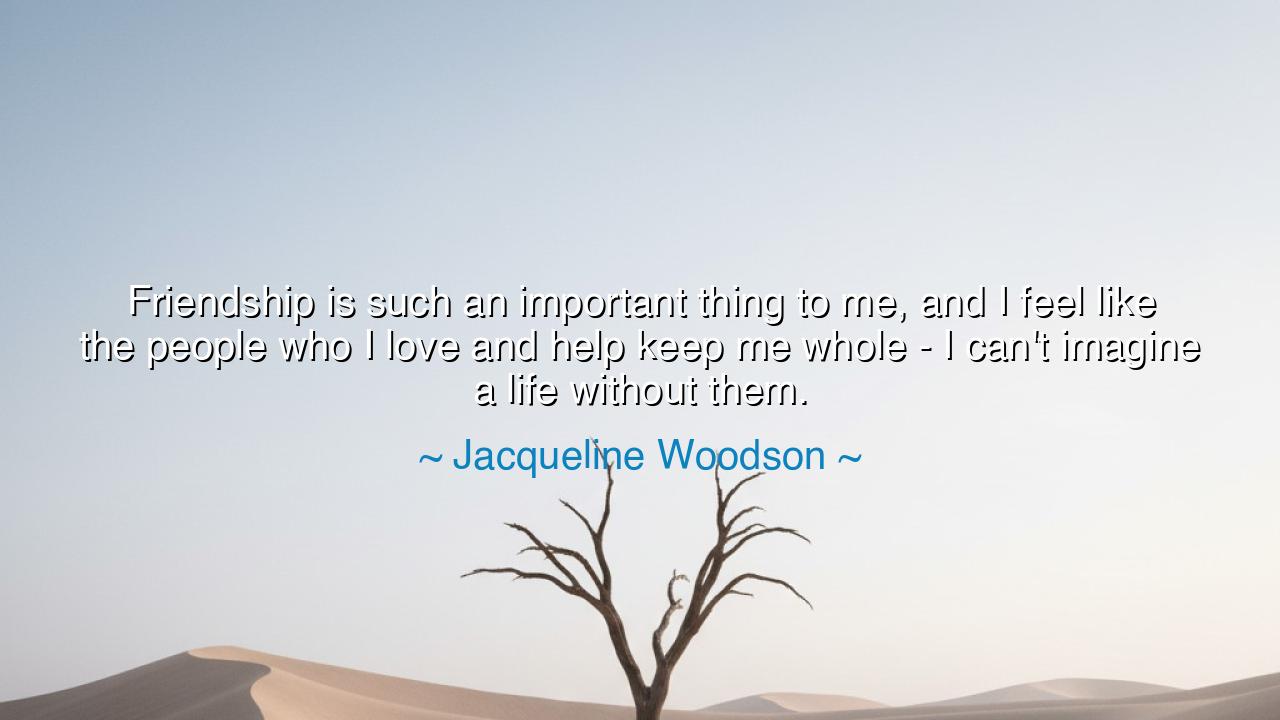
Friendship is such an important thing to me, and I feel like the
Friendship is such an important thing to me, and I feel like the people who I love and help keep me whole - I can't imagine a life without them.






In the vast and timeless journey of human life, there are few bonds as sacred as friendship. It is a force that sustains us, shapes us, and holds us together in the most challenging of times. Jacqueline Woodson encapsulates this truth in her words: "Friendship is such an important thing to me, and I feel like the people who I love and help keep me whole - I can't imagine a life without them." These words echo the eternal wisdom of the ancients, for friendship—the true kind, forged in love, trust, and mutual support—is not a mere accessory to life, but the very essence of what makes life meaningful. Without the deep connection of friends, life can seem incomplete, a puzzle with missing pieces.
In the teachings of Aristotle, friendship was considered one of the highest forms of human relationship, a bond that went beyond mere companionship. For Aristotle, the ideal friendship was one where two souls connected not through self-interest, but through virtue, helping each other to become the best versions of themselves. Woodson’s words are deeply aligned with this ancient wisdom—friendship is not just about support, but about nourishment. Those who truly love us, who are by our side through the trials and tribulations of life, do not merely offer comfort; they help complete us, they keep us whole. They are the mirror in which we see our truest selves, and the light that illuminates our darkest paths.
The ancients knew that friendship was not only a source of joy but of strength. Take the example of David and Jonathan, whose friendship was immortalized in the Bible. Their bond was forged in times of strife, when loyalty and trust were in short supply. Despite the differences in their backgrounds—David, the young shepherd, and Jonathan, the prince—they formed a bond so powerful that it transcended familial ties and even political allegiance. When David faced the deepest adversity, it was Jonathan who stood beside him, offering love, guidance, and protection. Their friendship, deeply rooted in mutual respect and affection, is remembered not just for the times of joy they shared, but for the way they kept each other whole in the face of hardship.
In a similar vein, Woodson’s reflection on friendship speaks to the interdependence of human relationships. We are not islands unto ourselves. We are defined by the people we love and the friendships we cultivate. The Greek philosopher Socrates, through the words of his student Plato, spoke of the importance of companionship in the search for truth. He argued that no man could truly reach the highest knowledge or the fullest expression of self without the guidance and wisdom of a true friend. In this way, Socrates viewed friendship as an essential part of the journey towards enlightenment—a bond that would complete the individual and help them reach their highest potential.
The importance of friendship also transcends personal connection and touches upon the well-being of the larger community. The Romans understood that a strong society was built upon the foundation of trust and cooperation between its members. In their writings, they extolled the virtues of mutual support and the vital role that friendships played in the strength of their empire. In times of peace and war alike, the relationships between individuals—whether among citizens or leaders—shaped the future of the state. The lessons of mutual aid and companionship were not just personal but political, showing that the strength of any group, nation, or society depends on the strength of its bonds of friendship.
The lesson for us, then, is clear: we must cherish and nurture the friendships that sustain us. Just as Woodson speaks of those who keep her whole, we must recognize that true friendship is not merely a source of fleeting happiness, but the very foundation of our emotional resilience. The people we love and who love us are not just companions in moments of joy, but are the pillars that hold us upright during times of struggle. Friendship teaches us humility, compassion, and loyalty—qualities that not only enrich our lives but help us grow into better, more compassionate individuals.
In our own lives, we must make a conscious effort to seek out and nurture authentic friendships. Let us not allow the distractions of modern life—whether work, ambition, or personal struggle—to eclipse the people who provide the emotional nourishment we need. Let us dedicate time to those relationships, to the friends who have been with us through thick and thin, and to those whose love and support make us feel whole. Whether in the quiet moments of intimate conversation or the loud moments of shared laughter, we must recognize the treasure that friendship brings. As Woodson so eloquently states, friendship is not a luxury—it is the very essence of what it means to live a fulfilled life.
So let us walk forward in life with this wisdom: friendship is not just an important part of existence, it is the bedrock upon which all other relationships are built. Let us honor our friends, celebrate their presence in our lives, and, in turn, strive to be the kind of friend who keeps others whole, just as they keep us whole. In doing so, we will ensure that our lives are enriched not just by what we achieve alone, but by the enduring bonds we form along the way.






AAdministratorAdministrator
Welcome, honored guests. Please leave a comment, we will respond soon